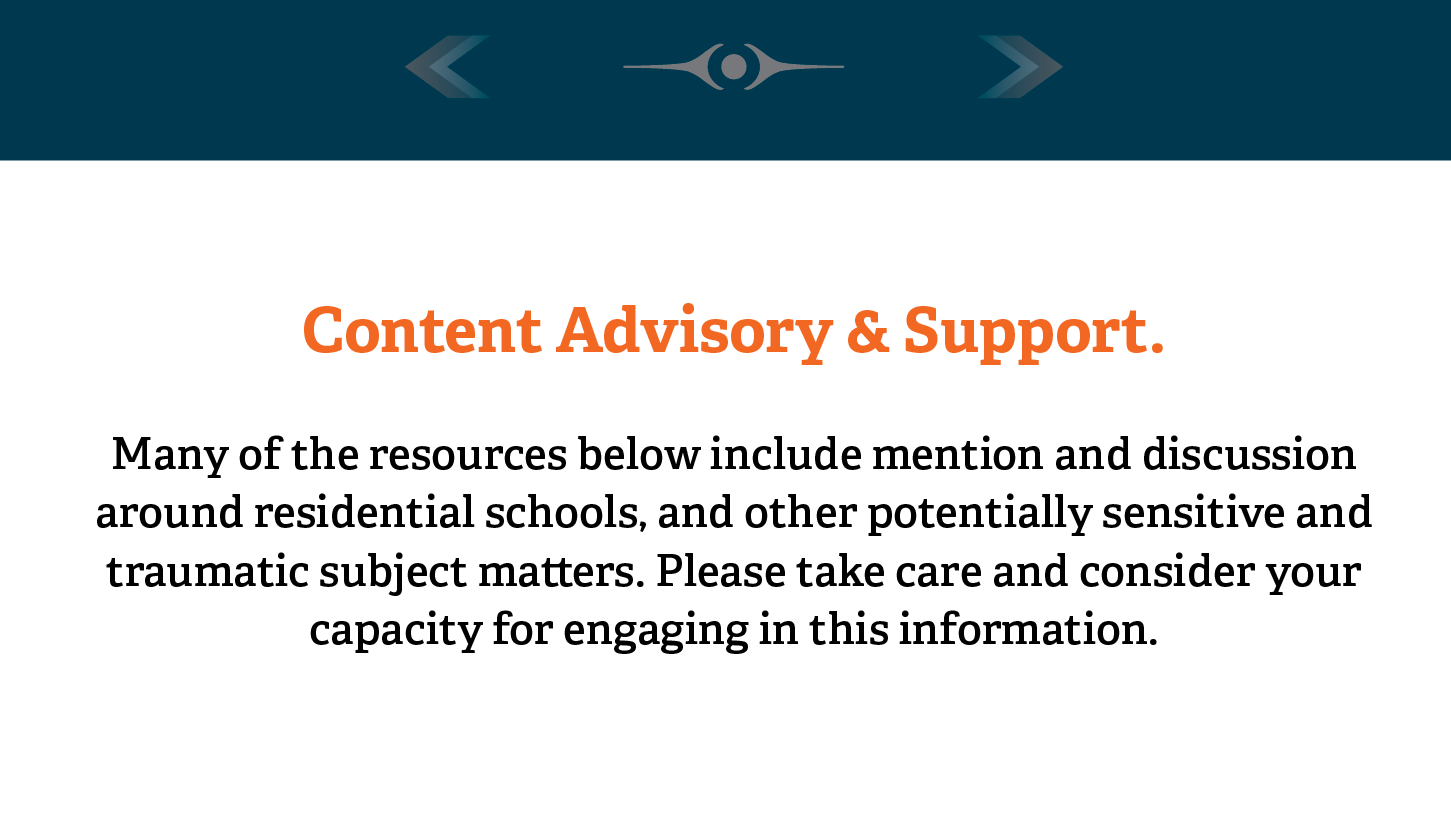For a Deeper Dive
The following resources have been compiled to help gain a better understanding of what Truth and Reconciliation means in a Canadian context. This includes information on the history of Indigenous people as well as a deeper grasp of issues that have affected Indigenous communities since colonization began. There are also many opportunities below that aim to help guide us in finding our own path forward with reconciliation.
We encourage everyone to seek out more information and learning as we reflect on our own responsibilities toward reconciliation both personally and professionally in the institutions and communities we are a part of.
The resources on this page are not meant to be comprehensive, so if you have suggestions for articles, podcasts, webinars, events, etc., we invite you to contact the Office of Equity, Diversity, and Inclusion at edioffice [at] langara.ca (edioffice[at]langara[dot]ca).
Listen
- The Secret Life of Canada (CBC): A podcast about the country you know and the stories you don't. Join hosts Leah-Simone Bowen and Falen Johnson as they reveal the beautiful, terrible and weird histories of this land. Some episodes of interest:
- Shanawdithit – Looking into the history of the Beothuk, the Indigenous people of Newfoundland
- The Indian Act
- Bay Blanket
- Crash Course on Friendship Centres
- The Mounties Always Get Their Land
- Unreserved is the radio space for Indigenous voices — our cousins, our aunties, our elders, our heroes. Rosanna Deerchild guides us on the path to better understand our shared story. Together, we learn and unlearn, laugh and become gentler in all our relations. Some episodes of interest:
- All My Relations: Discussions from the hosts around what it means to be Indigenous with super-smart and relatable experts to join them on topics like Native American mascots, Indigenous food and feeding the spirit, sexuality, and whether DNA test results should be linked to identity. Some episodes of interest:
- Henceforward: Mutually respectful conversations about the relationship between Indigenous and Black people in Canada, touching on topics like reparations, Black Lives Matter, reconciliation, and gentrification. Some episodes of interest:
- Telling Our Twisted Histories: Words connect us. Words hurt us. Indigenous histories have been twisted by centuries of colonization. Host Kaniehti:io Horn brings us together to decolonize our minds– one word, one concept, one story at a time. Some episodes of interest:
- Missing and Murdered: Finding Cleo
- Where is Cleo? Taken by child welfare workers in the 1970’s and adopted in the U.S., the young Cree girl’s family believes she was raped and murdered while hitchhiking back home to Saskatchewan. CBC news investigative reporter Connie Walker joins the search to find out what really happened to Cleo.
Watch
Senator Murray Sinclair, Chair of the Truth and Reconciliation Commission of Canada
Every Child Matters: Reconcilitation – Act One & Two
Documentary: nîpawistamâsowin: We Will Stand Up
- On August 9, 2016, a young Cree man named Colten Boushie died from a gunshot to the back of his head after entering Gerald Stanley’s rural property with his friends. The jury’s subsequent acquittal of Stanley captured international attention, raising questions about racism embedded within Canada’s legal system and propelling Colten’s family to national and international stages in their pursuit of justice. Sensitively directed by Tasha Hubbard, nîpawistamâsowin: We Will Stand Up weaves a profound narrative encompassing the filmmaker’s own adoption, the stark history of colonialism on the Prairies, and a vision of a future where Indigenous children can live safely on their homelands.
Documentary: Highway of Tears
- Highway of Tears is about the missing or murdered women along a 724 kilometer stretch of highway in northern British Columbia. You can rent the film here.
Documentary: We Know the Truth: Stories to Inspire Reconciliation
- A CBC Manitoba documentary that recasts Canada's history and future through the empowerment of Indigenous people. Meet Indigenous people who are telling the true history of Canada and residential schools and creating change on their own terms. Reflect with residential school survivors and be inspired by those who are working hard to keep their culture and languages alive.
Namwayut: we are all one. Truth and reconciliation in Canada
- Chief Robert Joseph shares his experience as a residential school survivor and the importance of truth and reconciliation in Canada in this documentary.
Support
Engage
Read
Langara’s Teaching and Curriculum Development Centre
- The learning, unlearning and relearning needed for decolonization and Indigenization is a lifelong journey. It begins by learning the truth about Canada’s historical and current relationship with the First Peoples of this land, implementing the Truth and Reconciliation Commission (TRC) Calls to Action, and exploring Indigenous cultures, perspectives, and worldviews with curiosity and respect. These resources offer a place to start that journey.
Langara Library: Self-study for Reconciliation
Langara Library Reading List
First Peoples: A Guide for Newcomers
- This guide introduces newcomers to three important topics: who are Aboriginal people (or First Peoples) in Vancouver and Canada; a brief overview of the relationship between the Government of Canada and First Peoples; and current initiatives and ways for newcomers to learn more about Aboriginal people in the community.
First Peoples’ Map of BC
- This map can be used to view Indigenous language regions, artists and artworks, place names and community landmarks. You can hear the pronunciation of language names, greetings, places and more. All of the 34 languages Indigenous to what is now called British Columbia are represented.
Vancouver Public Library: Indigenous Peoples in Canada Resource Guide
- This guide is intended to help you find resources on First Nations, Inuit, and Métis people and issues in B.C. and Canada, with a particular focus on Indigenous peoples in British Columbia.
Beyond 94
- This website that monitors progress on the Truth and Reconciliation Commission's 94 Calls to Action.
A Reconciliation Reading List
National Centre for Truth and Reconciliation Reports
United Nations Declaration on the Rights of Indigenous Peoples (UNDRIP)

